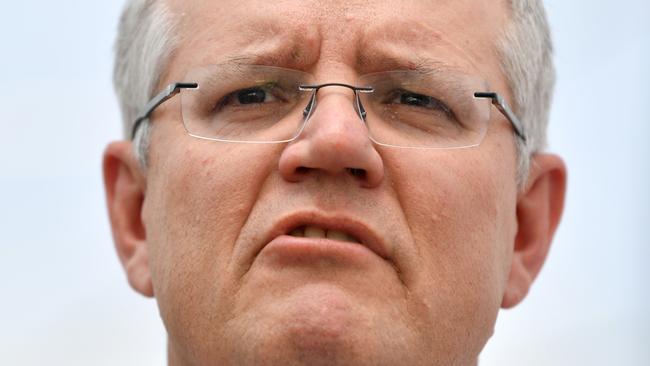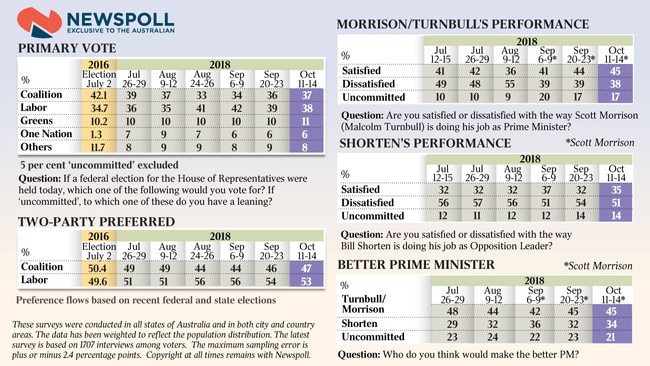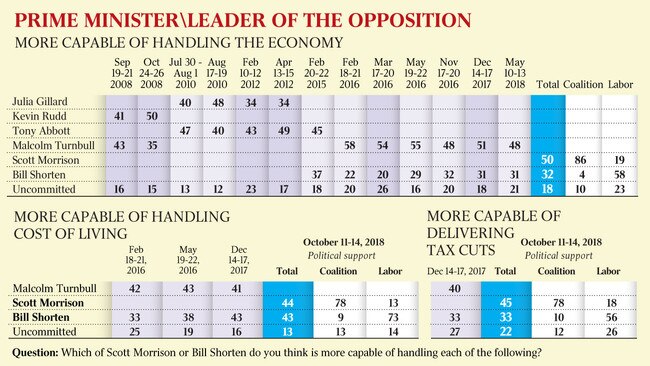Newspoll: Scott Morrison takes fight to Bill Shorten
Scott Morrison is now considered by Liberal voters as a better option than Malcolm Turnbull to battle Bill Shorten.

Scott Morrison is now considered by Liberal voters as a better option than Malcolm Turnbull to fight an election against Bill Shorten on key issues, as the Coalition continues to claw back electoral ground following a dramatic collapse in support sparked by the leadership spill.
The Coalition’s sustained political recovery comes ahead of Saturday’s critical by-election in Mr Turnbull’s former Sydney harbourside seat of Wentworth.
An exclusive Newspoll conducted for The Australian shows the Coalition continuing to peg back Labor’s commanding lead, with the two-party-preferred vote tightening a further point to 53-47, and three points since Mr Turnbull was forced from office in August.
The Newspoll, conducted between Thursday and yesterday, also shows the Prime Minister leading the Opposition Leader on every metric of better management, including the economy, delivering tax cuts and handling cost-of-living issues.
The Coalition’s primary vote rose a point to 37 per cent, marking the third consecutive lift in the polls for the government and a four-point rebound since the Coalition’s electoral stocks plummeted to record lows of 33 per cent when Mr Turnbull stepped down.
The Newspoll, based on 1707 interviews with voters across the nation, also reveals a bounce for Mr Shorten, with a boost in his personal approval ratings following an education policy blitz and a pledge of support for the government’s tax cuts for small business.
This was not enough to prevent Labor’s primary vote continuing to fall away from highs of 42 per cent in early September, dropping a further point to 38 per cent.
Support for the Greens lifted a point to 11 per cent while other minor parties fell a point to 8 per cent, with One Nation’s primary vote remaining unchanged at 6 per cent.
While the poll shows political momentum favouring the government, Liberal strategists believe it is unlikely to be reflected in Wentworth, a federation seat never held by Labor. Recent Liberal Party polling suggests the seat could be lost to high-profile independent Kerryn Phelps. A loss in the by-election would strip the government of its one-seat majority in parliament.
With parliament resuming today after a three-week break, Mr Morrison will introduce legislation to protect gay children from being expelled from non-state schools, in a move to neutralise a row over religious freedoms following the leaking of a government report designed to derail the Coalition’s Wentworth campaign. The government will also attempt to steer the political debate back to tax and the economy, with the introduction of legislation to enable further tax cuts for small to medium-sized businesses.
In a move by the Morrison government to target Mr Shorten over his tax grabs, worth almost $160 billion over a decade, Josh Frydenberg will today use previously released Australian Taxation Office figures to claim Australian individuals and self-managed super funds relied more on refundable franking credits than superannuation funds.
With 1.1 million Australians currently benefiting from refundable franking credits, the Treasurer said 900,000 people would be hit by Labor’s “retiree tax”.
Mr Frydenberg, using 2015-16 ATO data, will attack Labor over its dividend imputation crackdown, suggesting those who would be impacted are not “millionaires”.
The Treasurer said 84 per cent of the individuals impacted were on taxable incomes of less than $37,000, with 96 per cent of individuals falling under taxable incomes below $87,000.
Moves by Mr Shorten over the past fortnight to soften his class-war tone and appeal more directly to middle-class voters — with almost $20bn in funding promises for preschool and public schools — has paid dividends for the Opposition Leader personally, despite his approval numbers remaining low.
The Labor leader’s satisfaction ratings lifted three points to 35 per cent while those dissatisfied with him fell from 54 per cent to 51, leading to a net satisfaction rating of minus 16. Mr Morrison maintained a positive score of plus seven, which is the best for a prime minister since 2016.
Mr Morrison’s commanding lead over Mr Shorten as preferred prime minister fell back to 45-34 per cent, with the Opposition Leader gaining two points on his rival.
The Newspoll revealed that Coalition voters rated Mr Morrison ahead of Mr Shorten by a greater margin than Mr Turnbull had enjoyed over the Opposition Leader on the questions of who was more capable of handling the economy, cost-of-living issues and delivering tax cuts.
While Mr Turnbull enjoyed similar numbers as prime minister, he was not as highly regarded as Mr Morrison by Coalition voters, suggesting the new Prime Minister is winning back support from disaffected Liberal voters who had abandoned the Coalition following the removal of Tony Abbott.
The last time these issues were canvassed with voters was December last year when the Coalition was in almost an identical electoral position under Mr Turnbull as the government now is under Mr Morrison.
At that time, Labor led the Coalition by 53-47 on a two-party-preferred basis and Mr Turnbull led Mr Shorten as better prime minister by 41 to 34 per cent. The latest Newspoll shows Mr Morrison improving on the position of Mr Turnbull, who had fallen behind Mr Shorten on the question of who was better at handling cost-of-living issues.
The Prime Minister also holds an 18-point lead over Mr Shorten in relation to who is more capable of handling the economy, at 50 to 32 per cent.
On the critical election issue of cost of living, Mr Morrison re-established the Coalition’s lead over Mr Shorten, claiming a one-point lead at 44 to 43 per cent. In the December Newspoll, Mr Turnbull had fallen behind Mr Shorten by two points.
With the public debate over the two major parties’ competing personal income, corporate and dividend imputation tax policies becoming more focused under Mr Morrison, the Prime Minister has maintained the government’s lead in the category of who is more capable of delivering tax cuts.
Forty-five per cent of voters put Mr Morrison ahead of Mr Shorten, at 33 per cent, as the most capable of delivering tax cuts for Australians. Mr Morrison — who as treasurer implemented tax cuts for individuals and companies — achieved a five-point bump from where Mr Turnbull was last year.






